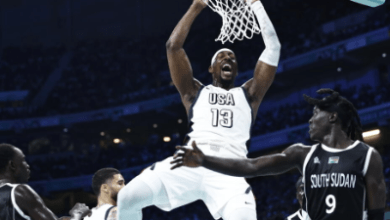The Evolution of Play Calling in College Football: Unveiling the Sign-Stealing Dilemma
In the ever-evolving landscape of college football, a burning question arises: why is sign-stealing still a concern in this age of technological advancement? The practice of coaches sending signals using their hands or giant posters adorned with pop culture figures seems like a relic of the past. This article delves into the intriguing world of play calling, its methods, and the persistent issue of sign-stealing that has dominated recent discussions in the sport.
Outdated Communication Techniques
One might wonder why, in a world brimming with cutting-edge technology, college football coaches are still relying on telephones to communicate with their players from the booth. It’s an era where tablets and headsets have become commonplace in the NFL for seamless communication. However, college football seems to lag in adapting to the 21st-century demands.
The Power of Signals in College Football
College football coaches, including those at the prestigious Power 5 level, often find themselves limited to laminated sheets of paper and conspicuous images held aloft as they call plays. This stark contrast to the tablet-wielding high school players they recruit begs the question: why this disparity in technology?
The Challenge of Sign-Stealing
Sign-stealing has become a growing concern in recent years, raising questions about the integrity of the game. While many play-callers continue to rely on hand signals to convey plays on the field, others have experienced the theft of their signals, a practice that combines in-person scouting with electronic assistance.
The Michigan Controversy
The NCAA has not been immune to the sign-stealing issue, as evidenced by the ongoing investigation into the University of Michigan. Allegations of sign-stealing spanning three years have put the university under a cloud of suspicion. Former Michigan staffer Connor Stalions is at the center of this controversy, accused of purchasing tickets to games of both Big Ten opponents and potential College Football Playoff foes.
The Unsung Hero: CoachComm
Amidst the sign-stealing debacle, CoachComm has emerged as a crucial player in the world of communication technology for coaches and players. Based in Auburn, Alabama, CoachComm boasts a three-decade-long reputation for developing cutting-edge technology tailored to coaches’ needs.
CoachComm’s X-System, popularly known as “Coach X,” is the go-to choice for most FBS and FCS programs. It provides reliable audio communication for coaches during games. The company’s innovative “Player X” system allows coach-to-player communication, promising to revolutionize how coaches interact with their teams.
The success of CoachComm’s technology has been evident in recent games. Grambling State and Southern employed “Player X” during the Bayou Classic, and the results were impressive. Coaches could seamlessly call plays and provide real-time guidance to players.
Unpopular NCAA Rule Bans James Madison From College Football Postseason
So, why hasn’t this technology become the norm in college football games? The answer is twofold: cost and concerns about competitive disadvantages. While the cost of implementing such technology isn’t negligible, the competitive disadvantages brought about by sign-stealing make this notion somewhat ironic.
While the adoption of advanced communication systems may be on the horizon for some teams during the upcoming bowl season, a comprehensive change in the NCAA’s technological rules would still require time. CoachComm is ready to deliver these innovations quickly, making the transition smooth for coaches who already understand the system.
In conclusion, the issue of sign-stealing in college football has reached a critical juncture. As technology continues to advance, it is essential for the NCAA to embrace these innovations to preserve the integrity of the game. CoachComm’s revolutionary communication systems offer a promising solution, giving coaches and players the tools they need to succeed while safeguarding the sport from unfair practices. The future of college football lies in adapting to the digital age and leaving behind the relics of the past.



